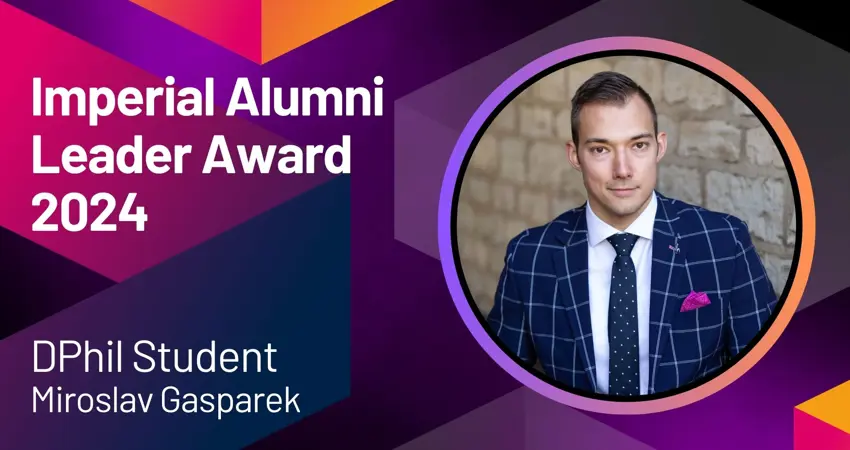29 May 2024
DPhil Student Miroslav Gasparek wins Imperial College Emerging Alumni Leader Award 2024 for entrepreneurial activities
Gasparek and colleagues aim to develop the world’s first cell-based platform to deliver high-quality and accessible mRNA medicines to millions of patients

Profile image by Zute Lightfoot
Engineering Science DPhil Miroslav Gasparek has won an Emerging Alumni Leader Award 2024 from Imperial College London for his entrepreneurial activities. Miroslav completed his MEng at Imperial College London, before pursuing a DPhil in Engineering Science at Oxford under the supervision of Professor Antonis Papachristodoulou and Professor Harrison Steel.
Now in the late stages of his part-time DPhil in data-driven control and synthetic biology at Oxford, Miroslav is the Chief Executive Officer of start-up Sensible Biotechnologies, which he Co-Founded with Chief Scientific Officer Marian Kupculak, DPhil (DPhil in Biochemistry, New College, 2021), developing mRNA technology that aims to tackle diseases in a scalable and cost-effective way.
He had only been in Oxford for six months when the pandemic hit. Many of Oxford’s Engineers got involved in solving the challenges presented by Covid-19 and the lockdown – and Miroslav was no exception. First, he worked on modelling COVID-19 disease spread with a group at the Slovak Ministry of Health. This sparked his interest closer to biosecurity. He then worked with Dr Megan Palmer at Stanford University on biosecurity of engineered microbial communities and advised Prof Jozef Suvada, a member of the World Health Organisation’s Executive Board, on national biosecurity. However, after his co-founder Marian finished his DPhil, they focused on the development of novel mRNA technology – crucial to the development of novel mRNA medicines and vaccines – in their first laboratory at the Institute of Virology of Slovak Academy of Science in Bratislava, Slovakia, independent of Miroslav’s DPhil work focused on optimal bioproduction in microbial communities.
mRNA technology existed a long time before the pandemic, but no mRNA medicines successfully reached patients. As the race to develop Covid-19 vaccines unfolded, mRNA technology came to the forefront and is now showing huge potential in areas beyond infectious diseases . “It became clear we needed a new method to make ‘better’ mRNA with an improved purity and functionality in a cost effective way if the molecule were to be used for treatment of other diseases – or rapid protection against them”, he says.
The mRNA is a molecule holding a code which instructs the body to construct a protein of interest. Our cells naturally contain proteins whose job it is to recognise harmful bacteria, microbes and toxins and alert the immune system to fight the threat. But as Covid-19 was a new virus, the body was often unable to build up a proper immune response early enough. Injecting the mRNA vaccines triggered a similar response, training the immune system to prepare for and recognise the disease if it is contracted.
Miroslav, Marian and their colleagues are interested in the potential of the mRNA technology for other diseases – including cancer and rare diseases. Its ability to deliver instructions to cells in the body to produce proteins means it could make new cell therapies, gene therapies or novel cancer treatments. Miroslav and Marian co-founded Sensible Biotechnologies to build a completely differentiated way to produce mRNA, aiming to produce mRNA with novel properties in a scalable, accessible and cost-effective way.
They are partnering with Ginkgo Bioworks, a major public company and a leader in synthetic biology, as well as with other leading academic and industrial organisations across the globe. They also have a team of scientific advisors including global experts in mRNA technology. To support this development, they raised millions of dollars from leading life science investors from the US and Europe.
“Our objective is to develop the world’s first cell-based platform enabling high-quality and accessible mRNA medicines to millions of patients faster. We also want to be a fundamental part of critical biomanufacturing infrastructure and increase global biosecurity by making mRNA manufacturing faster, less resource-intensive and simpler”, Miroslav explains.




